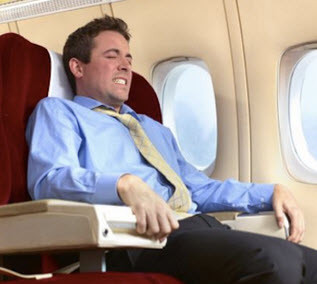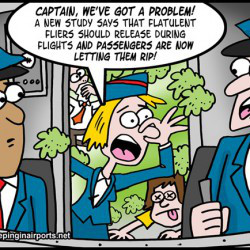 Now that I’m retired, I don’t fly as much as I used to when I was still gainfully employed. In fact, I haven’t sat my butt down in a plane since I retired. And I don’t miss it. Not one bit.
Now that I’m retired, I don’t fly as much as I used to when I was still gainfully employed. In fact, I haven’t sat my butt down in a plane since I retired. And I don’t miss it. Not one bit.
When I did have to sit my butt down in a plane, especially when the plane was full, some passenger would inevitably pass gas. Yes, they’d let one fly, so to speak. You rarely heard the fart, but you could definitely smell them as the aroma wafted toward you.
Unfortunately, it was hard to tell which passenger did the deed. I didn’t want anyone to think I was the culprit, so I’d crunch up my face and look around, giving a clear indication to anyone who happened to look my way that I was the victim, not the perpetrator.
But I remember when, a few years back, some significant news came out of a 3,000-word essay by five researchers from Denmark and Britain that was published in the New Zealand Medical Journal. Danish gastroenterologist Jacob Rosenberg, after experiencing the malodorous problem of flatulence firsthand on a flight from Copenhagen to Tokyo, enlisted some of the finest minds in his field to address the issue of farting at 35,000 feet.
It turns out that high altitude air pressure changes in airplanes cause more gas to brew in the belly. Most people — but not all, I can assure you from personal experience — do try to stifle their farts due to the stigma of potentially cutting a stinky one while in such close proximity to other passengers.
But the researchers suggested that holding back one’s gassy emissions has significant drawbacks, such as discomfort and even pain, bloating, indigestion, and heartburn. “Moreover,” wrote one researcher, “problems resulting from the required concentration to maintain such control may even result in subsequent stress symptoms.”
 So fliers, as the researchers noted, “There is actually only one reasonable solution: just let it go.”
So fliers, as the researchers noted, “There is actually only one reasonable solution: just let it go.”
The study recommended that airlines start using charcoal to deal with the smell of passengers’ mid-flight gas releases. The authors proposed that active charcoal be embedded into the seat cushions, since charcoal is able to neutralize odors.
Can’t you see it coming? The airlines will now start charging extra if you want to purchase a ticket for a fresh-smelling, charcoal-infused seat.
This post was written in response to today’s one-word prompt: passenger.
Advertisements Share this:




